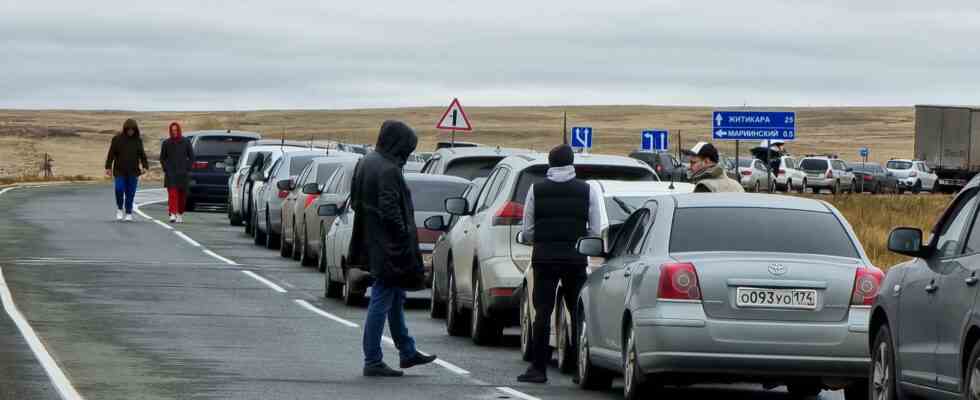Status: 09/29/2022 1:09 p.m
More and more young Russian conscripts are fleeing partial mobilization to neighboring countries. Russia is now making it more difficult to leave the country and is filtering out conscripts at the borders with Kakhakhstan and Georgia.
Partial Russian mobilization to fight in Ukraine continues to drive Russians to leave their country to avoid conscription. They crossed borders by car, bike, e-scooter and on foot. Long queues of cars clogged roads leading out of Russia. Moscow set up draft offices at border crossings to intercept some of them.
At the main border crossing at Karausek in the Russian region of Astrakhan on the border with Kazakhstan, the passports of those leaving the country would be compared with the draft lists, according to eyewitness reports. Anyone who falls under the mobilization criteria and does not have an official deferment or an exit permit from the military is not allowed to leave the country.
According to the Kazakh migration authorities, almost 100,000 Russian citizens have entered Kazakhstan since the partial mobilization of reservists was announced.
Russians line up to get Kazakh registration.
Image: picture alliance/dpa/AP
Georgia fears for internal security
Emigration from Russia to Georgia, which borders to the south, has also become more difficult. There are numerous reports of men with no military training and of all ages who are said to have received draft orders.
Alexander Kamissentsev, who left his native Saratov, said he decided to leave at the last moment because he didn’t want to kill his Ukrainian brothers or go to jail. He described the situation on the Russian side of the border with Georgia to the AP news agency:
It’s all very scary – tears, screams, a large number of people. There’s a feeling that the government doesn’t know how to organize it. It seems like they want to close the border but at the same time they fear protests could follow and are letting people go.
Georgia fears for internal security given the situation. Demonstrators with Georgian and Ukrainian flags and signs reading something like “Kill Russia” greeted the Russian arrivals at the border.
Giga Lemonjawa from the Georgian party Droa, which organized the protest, said the fugitives threatened Georgia’s security and economy. The Georgian Ministry of the Interior said that around 53,000 Russians had entered the country since last week.
People go to the Verkhny Lars border crossing between Georgia and Russia.
Image: AP
North Ossetia declares a state of alert
The Russian republic of North Ossetia in the Caucasus, which borders Georgia, had already announced entry restrictions on Wednesday. Many cars were prevented from entering the territory. A conscription office was set up at the Verkhniy Lars border crossing, Russian news agencies reported. Some media released footage showing a black van with “Military Drafting Office” inscribed on it.
Meanwhile, a state of alert was declared. Food, water, warm-up facilities, and other help should be provided for those who have already waited days in line. Volunteers on the Georgian side of the border also brought water, blankets and other supplies.
Another draft checkpoint in Russia has been set up along the Finnish border, independent Russian media outlet Medusa reported. Russia has land borders with 14 countries.
Lithuania: mass exodus also a weapon?
Lithuania’s former head of state Vytautas Landsbergis has warned that Russians fleeing mobilization abroad could potentially be used to destabilize their host countries. “Now they are fleeing to a safer place, but the question is whether this mass exodus is not also planned and is another ugly weapon,” he said on the radio.
Accordingly, the Kremlin “could use them for some referenda, votes to ask Uncle Putin for help,” said the 89-year-old, who headed the Baltic EU country after Lithuania regained independence from the Soviet Union in 1990.
So far, there is no common line within the EU on how to deal with Russian conscientious objectors who want to leave their homeland. A first crisis meeting of the 27 EU ambassadors on Monday brought no solution. The EU Commission was asked to “review, evaluate and, if necessary, update the latest guidelines on issuing visas, taking into account the security concerns of the Member States,” the current Czech EU Council Presidency said afterwards.

